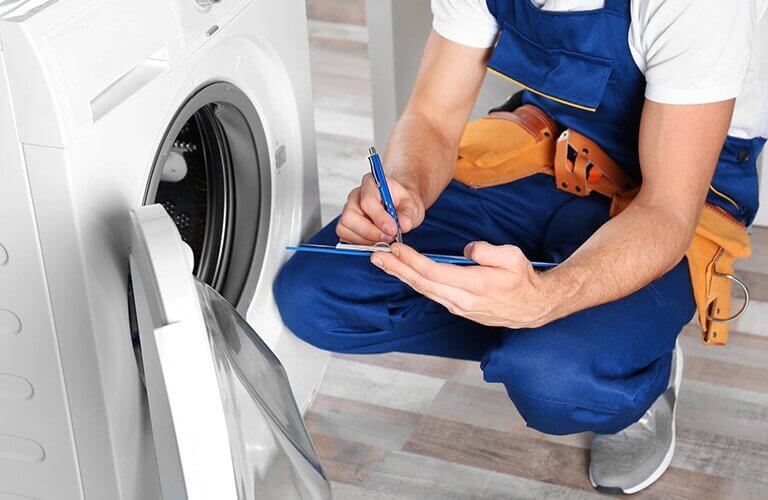Finding a puddle near your idle washing machine can be confusing. You might be wondering, “Why is my washing machine leaking when not in use?” There can be several reasons, ranging from simple maintenance issues to more serious mechanical problems.
This guide will help you identify the culprit behind your washing machine leaks and get things fixed up.
Common Causes Of Leaking Washing Machine When Not In Use
When you notice water pooling around your washing machine, even though it hasn’t been used recently, it’s essential to identify the cause quickly. Let’s start by looking at each of these causes.
-
Faulty Water Inlet Valve
The water inlet valve is a crucial component as it controls water flow into your washing machine. However, with time, this valve could wear out or get clogged due to sediments, preventing it from shutting off completely. When this happens, water can slowly seep into the machine, eventually causing it to overflow and cause a leak in the washing machine. To fix this, you can check the valve for any visible damage or sediment buildup. If cleaning doesn’t resolve the issues, it might be time to change the valve.
-
Clogged or Damaged Drain Hose
The drain hose expels water from the machine after each cycle. If the hose is clogged or damaged, water can back up and leak out, even when the machine isn’t running. To troubleshoot this, inspect the drain hose for any blockages or cracks. If you find a clog, try to clean it with a hose cleaner or by simply flushing it out with water. However, there can also be chances of the hose being damaged, which is when replacement becomes paramount.
-
Leaky Door Seal
Front-loading washing machines have a rubber door seal that creates a watertight barrier. However, this seal can wear out, crack, or become damaged over time, allowing water to escape. Regularly inspecting and cleaning the door seal can help you spot issues early. If the seal is damaged beyond repair, then replacing it is the best solution.
-
Faulty Pump
The pump in your washing machine expels the water during the drain cycle. If the pump is cracked or the seals around it are worn out, it can cause continuous leaks. Diagnosing a faulty pump usually requires a closer inspection or professional help. If you suspect the pump is the issue, you might notice water leaking from the bottom of the machine. A professional technician can confirm the problem and recommend repairing or replacing the pump in cases where the washing machine is leaking underneath.
-
Residual Water In The Machine
Sometimes, water left in the drum or detergent dispenser after a cycle can slowly leak out. This residual water can be troublesome but is usually easy to address. Ensure the machine is completely emptied after each use; you can run a quick spin or drain cycle just to be sure.
Preventive Measures And Solutions
Since a washing machine leaking water can be a real headache, here are some key preventive measures and solutions to keep your machine in optimal condition and prevent leaks altogether:
- Regular Maintenance
One of the most effective ways to prevent leaks is to inspect and maintain your washing machine regularly. This includes checking the hoses, door seal, and water inlet valve for any signs of wear and tear. Look for cracks, splits, or loose connections. Cleaning these components can prevent sediment buildup, which can lead to leaks. By keeping an eye on these parts and addressing minor issues promptly, you can extend the life of your washing machine.
- Timely Repairs
You must address the washing machine issues as soon as they arise to prevent small problems from becoming significant. If you notice a small leak, don’t ignore it; instead, investigate the source of the leak and take action immediately. Also, replacing worn-out parts promptly can save you from more extensive and costly repairs later on. It is also important to have a basic understanding of your washing machine’s components to identify when something is wrong and take the necessary steps to fix it.
- Proper Usage
Using your washing machine correctly can prevent unnecessary strain on its components and reduce the risk of leaks. Avoid overloading the machine, as this can put excessive pressure on the drum and other parts, leading to damage and leaks. Additionally, use the recommended amount of detergent, as excessive detergent can create build-up within the machine, clogging hoses and other components, resulting in leaks. Plus, follow the manufacturer’s guidelines for load size and detergent use to ensure your washing machine operates efficiently and leak-free.
- Professional Inspection
If you are unable to identify the source of the leak or if the problem persists despite your efforts, it’s wise to call in a professional. An experienced professional can diagnose the problem accurately and recommend the best course of action for a washing machine leaking water. Regular professional inspections can also be beneficial, as they can identify potential issues before they become serious.
Conclusion:
Understanding why your washing machine leaks when not in use is crucial for preventing damage and avoiding costly repairs. While some issues can be resolved with regular maintenance and timely repairs, others may require the expertise of a company that offers professional washing machine repairs in Brisbane. Opting for professional help ensures accurate diagnosis and effective solutions, keeping your appliance in top working condition.
If you are experiencing persistent leaks and can’t identify the source, call us at 0428 149 923 for professional assistance.

